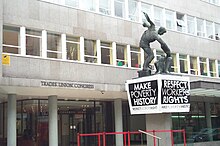
The 1926 general strike in the United Kingdom was a general strike that lasted nine days, from 4 to 12 May 1926. It was called by the General Council of the Trades Union Congress (TUC) in an unsuccessful attempt to force the British government to act to prevent wage reductions and worsening conditions for 1.2 million locked-out coal miners. Some 1.7 million workers went out, especially in transport and heavy industry.

The Scottish Trades Union Congress (STUC) is the national trade union centre in Scotland. With 40 affiliated unions as of 2020, the STUC represents over 540,000 trade unionists.

The Tolpuddle Martyrs were six agricultural labourers from the village of Tolpuddle in Dorset, England, who were arrested and tried in 1834 for swearing a secret oath as members of a friendly society. Led by George Loveless, the group had formed the Friendly Society of Agricultural Labourers during a labour dispute over wage cuts that reduced their income to near-starvation levels. Such unions were technically legal, but the British government, wary of organised labour, invoked an obscure 1797 law against "unlawful oaths" to bring charges. In R v Loveless and Others the men were convicted and sentenced to penal transportation in Australia. They were pardoned in 1836 after mass protests by sympathisers and support from Lord John Russell, and returned to England between 1837 and 1839. Most of the men later emigrated to Canada.
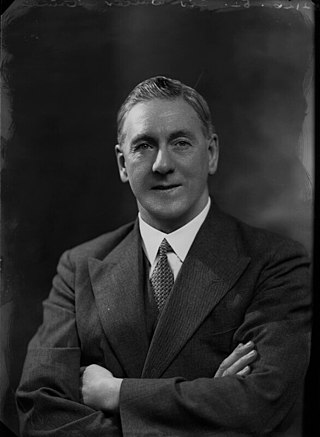
Walter McLennan Citrine, 1st Baron Citrine, was one of the leading British and international trade unionists of the twentieth century and a notable public figure. Yet, apart from his renowned guide to the conduct of meetings, ABC of Chairmanship, he has been little spoken of in the history of the labour movement. More recently, labour historians have begun to re-assess Citrine's role.
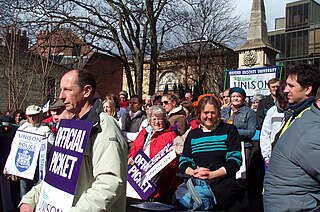
Trade unions in the United Kingdom emerged in the early 19th century, but faced punitive laws that sharply limited their activities. They began political activity in the late 19th century and formed an alliance with the Liberal Party in the early 20th century. The grew rapidly 1900 to 1920, lost their legal disabilities, and were well established by the 1920s. Union members largely switched from Liberal to the new Labour Party. Its leader Ramsay MacDonald became prime minister in 1924 briefly, and then again in 1929. In the 1980s Margaret Thatcher's Conservative governments weakened the powers of the unions by making it more difficult to strike legally. Most British unions are members of the TUC, the Trades Union Congress, or where appropriate, the Scottish Trades Union Congress or the Irish Congress of Trade Unions, which are the country's principal national trade union centres.
Community is a British trade union which formed in 2004. The union represents workers in a diverse range of sectors, including iron and steel, justice and custodial, domestic appliance manufacturing, textiles and footwear, road transport, betting, the third sector, education and early years as well as the self-employed.

The General Federation of Trade Unions (GFTU) is a national trade union centre in the United Kingdom. It has 35 affiliates with a membership of just over 214,000 and describes itself as the "federation for specialist unions".
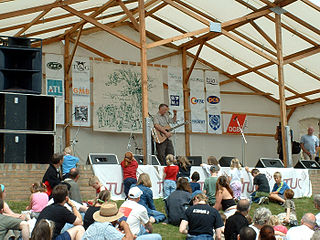
The Tolpuddle Martyrs' Festival and Rally is an annual festival held in the village of Tolpuddle, in Dorset, England, which celebrates the memory of the Tolpuddle Martyrs. The event is a celebration of trade unionism and labour politics organised by the Trades Union Congress (TUC) South West office, with the support of unions. The festival is usually held in the third week of July, and features a parade of banners from trade unions, a memorial service, speeches and music.

The National Union of Agricultural and Allied Workers (NUAAW) was a trades union representing farmworkers in the United Kingdom. The Union was founded in 1906 by trade union activist George Edwards. It was dissolved in 1982 when it merged into the Agricultural Section of the Transport and General Workers' Union.

The Sheffield Trades and Labour Council, usually known as the Sheffield Trades Council, is a labour organisation uniting trade unionists in Sheffield.

The Amalgamated Society of Boilermakers, Shipwrights, Blacksmiths and Structural Workers (ASB) was a trade union in the United Kingdom. Many of its members worked in shipbuilding, in which industry it was the leading trade union, while over time it also developed strength in engineering and construction.

The Irish Trades Union Congress (ITUC) was a union federation covering the island of Ireland.
The Women's Trade Union League, founded in 1874 and known until 1890 as the Women's Protective and Provident League, was a British organisation promoting trade union for women workers. It was established by Emma Paterson, who had seen unions managed by working women in America.
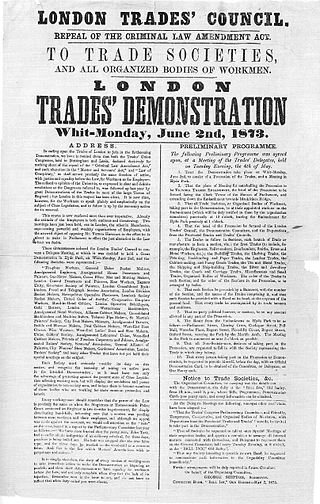
The London Trades Council was an early labour organisation, uniting London's trade unionists. Its modern successor organisation is the Greater London Association of Trades (Union) Councils
The South African Trades Union Congress (TUC) was a national trade union federation in South Africa.
The Parliamentary Committee of the Trades Union Congress was the leading body of the British trade union movement from 1871 until 1921.
The History of trade unions in the United Kingdom covers British trade union organisation, activity, ideas, politics, and impact, from the early 19th century to the recent past. For current status see Trade unions in the United Kingdom.

The National Federation of Women Workers (NFWW) was a trade union in the United Kingdom of Great Britain and Ireland active in the first part of the 20th century. Instrumental in winning women workers the right to a minimum wage for the first time, the NFWW broke down barriers for women's membership in trade unions in general.
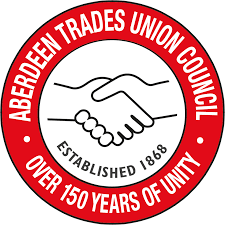
Aberdeen Trades Union Council (ATUC) is the body made up of affiliated trade union branches and organisations working in the Aberdeen and Aberdeenshire area to promote the interests of workers in the region. The ATUC provides services to affiliated branches on a wide range of industrial, social and community issues and is affiliated to the STUC. It has an office based in Aberdeen, Scotland.
The Notts Trades Council, formally known as the Nottinghamshire Nottingham and Mansfield Trades Council, brings together trade unionists in Nottinghamshire, in England.



